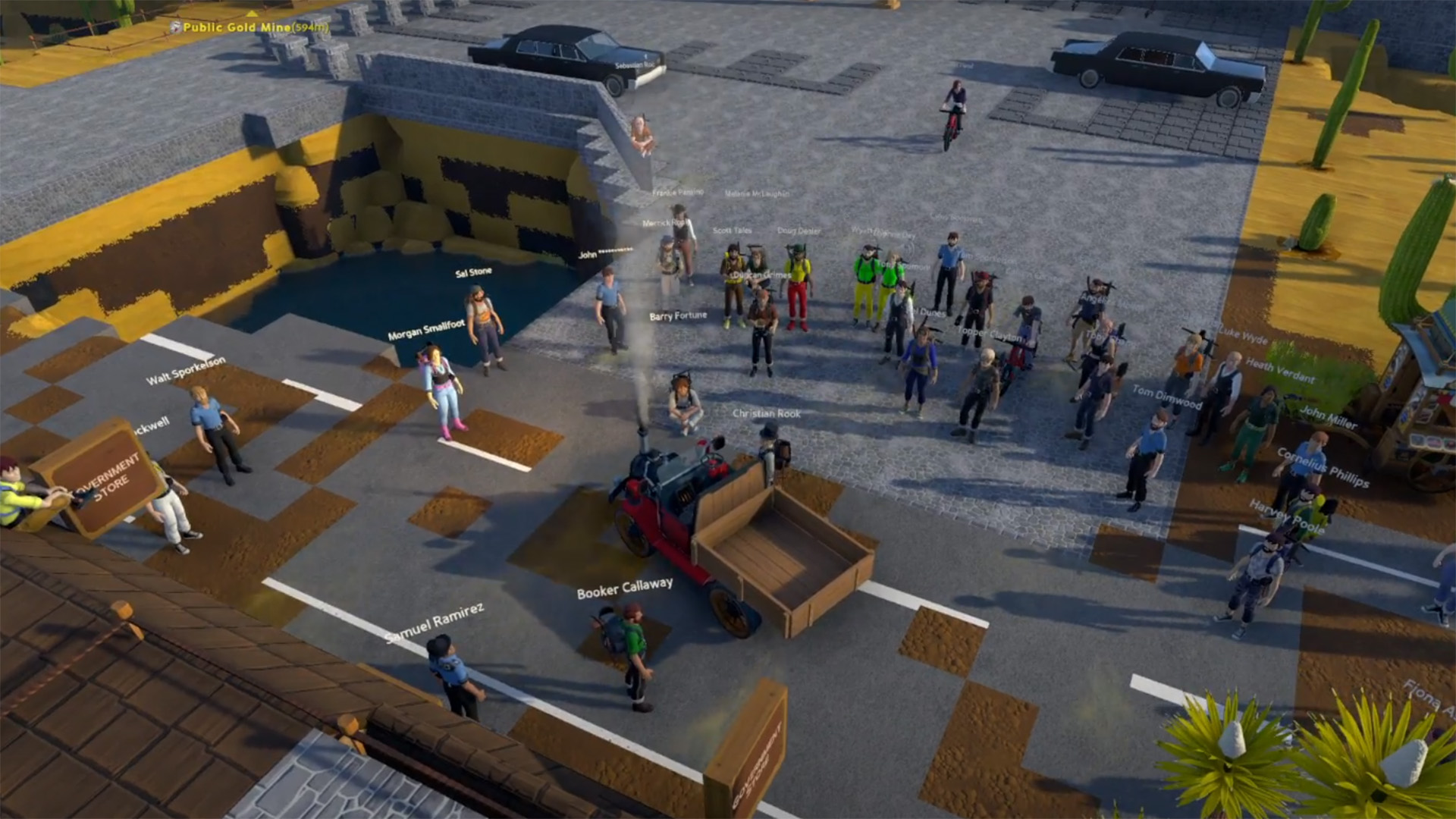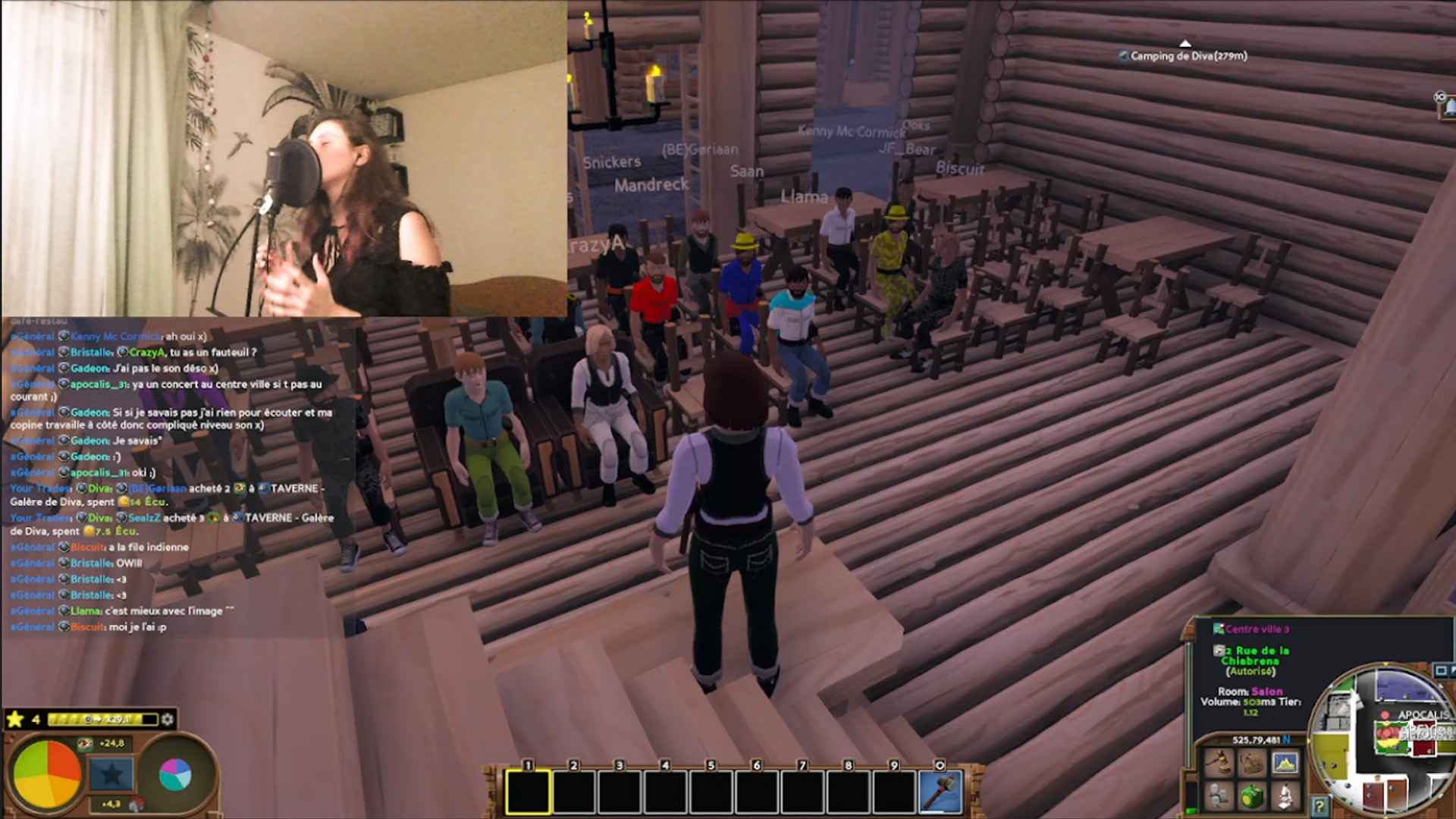

Building a Beneficial Metaverse, Part I:
Players as Citizens
John Krajewski, CEO Strange Loop Games
It’s an odd fact of video games that despite earning more revenue than movies and music combined, their cultural footprint has historically been far smaller than either. Why is that?
Perhaps it’s because a great many games have for so long occupied the space of being an escape from reality. They’re seen as something outside of life, a diversion. Other media and interactions aren’t seen that way to the same extent, they mix with the rest of your life more. Video games, however, often get labelled as an escape, a retreat from life; that is, a place you go to get away from your troubles. To forget your problems and envelop yourself in fantasy.
But charting the recent trajectory of games, it’s clear that this is rapidly changing. Games are more and more culturally relevant and present in our lives, with (at last) successful TV and movie adaptations, stadium-filling events, and more people connecting online through games than ever. The buzzword of the ‘metaverse’ rings out, although nobody seems to have a firm grasp what it means, but it’s clear that games are the vanguard of whatever is to come. Virtual worlds like Roblox dominate the market, populated with user-generated content. Celebrities are joining streamers to play games on Twitch, or perform in virtual concerts in front of millions. More ages and demographics of people play games than ever before, on all kinds of devices. Games, already the financial king of media, appear to be at last ascending the cultural throne.
And as they do so, they will need to continue evolving beyond being simply an escape. They will need to provide real value to those that occupy these virtual worlds, to add to their life in meaningful ways that aren’t limited to the game alone but reach out into the rest of their life. Although an occasional retreat from life can be a good thing, the domain of an escape will not be sufficient for a world where games are the center of culture. In fact, to live up to their full potential games need to become the opposite of an escape.
While an activity that functions as an escape prevents connections to the rest of one’s life, the opposite will enhance those connections. While an escape disconnects you from others, the opposite will foster deep relationships with people. While an escape puts you into a world that asks little of you, the opposite will require you to gain valuable skills to succeed. And while an escape needn't aim to add value outside of its own entertainment, the opposite is valuable socially, emotionally, financially and otherwise.
As they become the center point of culture, we need to see more games that are all of that: a meaningful engagement with yourself, the world, and others.
The question is, what does this look like?
For a game to provide a meaningful engagement, it’s greatly benefited by being a virtual world, that is, a persistent online world connecting many people together, with a life of its own. It would need to assign the players meaningful goals, which can be achieved only with meaningful skills relevant to the real world. It will require them to cultivate meaningful relationships with other occupants of the world, forming meaningful communities. And it would need to provide meaningful ownership to those communities of the value they create.
Distilling all this down into a single all-encompassing idea, we can frame it as follows.
The occupants of virtual worlds need to be more than just players, they need to be Citizens.
A Citizen has both rights and
responsibilities.
Responsibilities, in a game? The idea seems almost
antithetical, but I see within it the key to unlocking huge depths of meaning and value from games.
When a virtual world is focused on grand societal goals and the relationships among thousands of
real people, there is a real responsibility there, and fulfilling responsibilities is one of the
most meaningful parts of life.

The
government auctions off vehicles to fund recovery after a disaster in our game Eco
A Citizen is not a customer.
The relationship of a
Citizen to their society is not one of consumption. They are not there simply to pay a fee and
absorb an experience. They are there to contribute, to connect, to engage, to create. They aren’t
just receiving value; they are the value; they themselves create it and extend it through the
relationships with and within the world. It might take the form of a building they construct, or a
mod they produce which others can use, or a delivery service they run, or a conference they organize
in-game, or a township they found that offers value to others, or a campaign they run for election
of an amendment, or any other form they invent. As creators of this value in its myriad forms, they
have both ownership and responsibility for it; it is theirs to maintain, share, extend, protect,
monetize, and, should they be derelict in their responsibilities, to lose.
A Citizen is both the occupant and architect of the civic system in which they exist. For a virtual world to be run by its Citizens, this is a required case: the rules of the system must be defined and maintained by its adherents. That recursive relationship, where you function both as an individual and as a part of the collective of individuals, presents a ‘strange loop’ of infinite complexity and emergent value. A system that eats its own tail in that way has a certain self-directed consciousness, and forms an engine of value out of nothing.
A Citizen is not a lone wolf.
They are a member of
the collective, crafting the direction of their virtual history through relationships. Those are
relationships between real people, of richly defined virtual identities, with different goals,
values, and skills; who despite this fact can join together in common endeavors. When the world is
based on a deep simulation and the goals are grand society-impacting projects, those relationships
become incredibly meaningful, as real as any in life.
That is to say, a Citizen is far more than a player, and it is the ideal model for occupants of
virtual worlds that provide the opposite of an escape.
All of this paints a very different picture than the current collectively imagined metaverse. That is, a kind of happy-consumer-chaos, with players doing ‘whatever they desire’, a never-ending theme park of experiences to absorb, dressed as Spiderman or a Jedi, wielding a blaster or a medieval sword, dancing using canned emotes they paid $5.99 for, attending a virtual concert where the crowd of thousands is all real players in real-time for some reason (would you notice if they weren’t?), all expressing their identities by what they consume. Fan/consumption culture taken to the logical infinite.
This can be fun for a moment, but it lacks the kind of depth that's needed to become a highly meaningful part of a person's life. I like theme parks as much as the next person, but we can aim higher: Disneyland is fun, but it has customers, not Citizens. People don’t create lasting societies there. They pay a fee for an experience.
We need a better beacon for games to aspire to. The idea of a theme park, a hang-out, a shooting gallery: these are all too easy and lazy. I want to see more from games, much more. I want to see games that give the kind of value you rank in your top-ten life experiences.
Those slots are reserved for much more meaningful things. Things like: deep relationships with people, facing hardships and overcoming them, growing as a person in character, knowledge, and emotion, helping others grow and become more themselves, self-expression in the act of doing all these things, understanding the world, bearing witness in awe of its beauty, being inspired, and creating further beauty, inspiration, and understanding from it.

Eco Citizens gather in their tavern to listen to a performance, while a twitch audience watches on.
The virtual worlds we create can aim so much higher than a set of cookie cutter experiences in a static, designed world, fed to us for small fees. Our self-expression and relationships can carve so much deeper in games than what pop-culture character’s outfit we wear. They can ask more of us and, in the process, give us the world.
Because I believe games can be absolute gifts. They were, and are, for me. But that doesn’t happen automatically. A virtual world needs to be a landscape that allows its citizens to create it, to define its meaning, and own its value. It’s a giant leap from games-as-an-escape, but it’s absolutely possible. Not only that, it’s imperative that we push in this direction, because if the alternative – an infinite escape – were to take center stage as ‘the metaverse’, it would not fulfill us, it would further distract us, sedate us, stupefy us, and be an overall net-negative on humanity. It’s the default, lucrative path. A better vision is within our reach.
This series of articles defines the core model and vision behind the virtual worlds that would make up a net-positive metaverse grown from games. In Part II, I explore the specific details of how such a virtual world could be designed to achieve that goal, and our progress doing so with Eco. In Part III, I describe how great numbers of worlds like these can be connected together over time, creating a bottom-up metaverse that offers a distinct alternative to the walled-gardens many companies aim to create, and which would provide great value to its Citizens. Together they outline our current direction at Strange Loop Games: building a beneficial metaverse.
This is the first article in a three-part series describing the vision of what we're building at
Strange Loop Games.
Click
here for Part II: Worlds
of Consequence.
Click
here for Part III: User
Generated Societies.
Email: [email protected], Twitter @jkrajewski